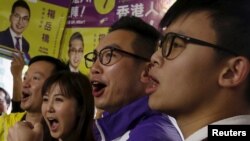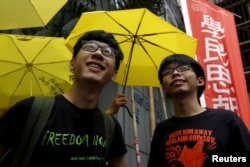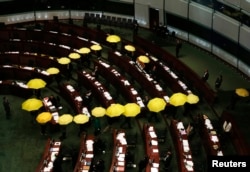Political jockeying is underway in Hong Kong ahead of September’s legislative council election, the first since pro-democracy lawmakers vetoed Beijing’s take-it-or-leave-it plan for selecting the territory’s next chief executive last year.
At the same time a generational shift is underway, shaking up older parties and giving rise to parties so new they are yet to be named. This reflects not only the upheaval caused by the youth-led Occupy Central protests in 2014, but also shifting demographics – and values - within the electorate.
The latest survey by the Public Opinion Poll at Hong Kong University shows public trust in both the Hong Kong and Beijing governments sharply plunging, with levels of distrust sharpest among respondents between 18-29 years old.
Hong Kong First
Joshua Wong, the bespectacled poster-boy of the Occupy movement, had previously dismissed traditional politics. But fighting the prolonged street action, and having nothing to show for it, was a sobering experience for him and fellow activists. At the same time, they showed themselves to be eloquent and more attractive to the general public than the senior government officials whom they confronted in a televised face-off.
He now says Scholarism, the student group that came to prominence during the Occupy Central protests, has decided to fold its tent and subdivide into a student group and a political party, with no formal link between them.
Wong says the new party’s focus is 2047, the year when Hong Kong’s Basic Law either expires or is extended by Beijing. The law is the basis for the one country-two systems formula that guarantees Hong Kong’s civil and political rights. Wong’s group wants Hong Kong people to choose their own future via a referendum, even though there is no law permitting a referendum and the administration opposes one.
Wong also says the post-Scholarism group will distance itself from established parties that want democracy and are collectively known as “pan-democrats.” He calls his fledgling party “pro-democracy but not pan-democratic.”
“Traditional politics is not useful because most of the pan-dems still believe dialogue, meeting and discussion may be necessary and effective for achieving democracy in Hong Kong, but it doesn’t mean that politics is useless or meaningless. It’s because we believe that if the new generation can represent some of the new values and enter the institution we can change and reform the current structure,” he told VOA.
While older pro-democracy politicians generally see democracy in China as a precondition for democracy in Hong Kong, the new breed of activists rejects that linkage and focuses instead on Hong Kong’s struggle.
“Actually, we believe Hong Kong would be the first step for us to achieve universal suffrage and democracy, and the next step would be achieved, let China have universal suffrage. Therefor, from my point of view, the first is Hong Kong and the next is China,” said Wong.
Wake Up Call
At the other end of the spectrum, the new chairwoman of the largest pro-Beijing party has resigned from Chief Executive CY Leung's Executive Council, Hong Kong's top policy-setting body.
Starry Lee, a legislator long tipped to take up leadership of the Democratic Alliance for the Betterment and Progress of Hong Kong (DAB), made the move in part to distance her party from the increasingly unpopular Leung.
Lee, a younger face among the DAB’s aging leadership, was immediately replaced as an advisor by a DAB stalwart in his sixties. But the departure frees her to focus on party building and to begin constructing an image of her own – something the mild-mannered accountant needs in order to emerge from the political shadows.
Her face is now appearing on the campaign posters of every potential DAB candidate.
She did not respond to VOA’s requests for an interview, but in a recent interview with The Sing Tao Daily, Lee said that leaving the Executive Council meant she could speak more freely and articulate her party's stance more clearly.
The DAB "is still a partner of government," she told the paper, "but in some policies the stance of the DAB is not the same as the government's."
Being able to speak out, Lee said, could help the party "get more support from the public."
The need to give DAB candidates wiggle-room, and get them more in line with public sentiment, became obvious two months ago when Holden Chow, one of the party’s promising young figures, finished more than 10,000 votes behind a young pan-democrat, the Civic party’s Alvin Yeung, in a Legislative Council by-election.
The loss was a wakeup call for the DAB.
Independence Call
But even more eye opening was the showing by Edward Leung, a member of the radical nativist movement, who polled about 15 percent of the total vote (66,524). In the winner take all race, he was the third-place finisher, but September’s poll will be run on a proportional list system and Leung’s tally would be more than enough to win a seat.
In fact, if he could raise his total by a just a few percentage points, he might be able to pull another nativist into the legislature on his coattail. His performance was a shot across the bow for established politicians on both sides.
A new group this week said it is going even further, forming a political party to push for full independence from China.
At a press conference this week, former Occupy Central activist Chan Ho-tin said his new National Party feels Hong Kong’s identity is being lost to the mainland under pressure from Beijing.
The party, made up mostly of about 50 university students and youth activists, says it will field legislative candidates for the upcoming election.
Functional Groups
On a deeper and less conspicuous level, moves are also underway that aim to undermine the establishment’s existing political structure by getting democracy supporters into the professional and social bodies that, in turn, elect lawmakers representing so-called “functional constituencies.”
These functional groupings form half of the 70-member legislature. In a number of these constituencies the voters are not individuals, but corporations. The other half of the legislature is directly elected from five geographical constituencies.
These functional constituencies also form voting blocs in the 1,200-member body that will select the next chief executive in 2017.
One group seeking to upend this structure is 2047 HK Monitor, a group of 200 younger professionals working in the financial sector, who coalesced during the Occupy Central movement.
The founder and convener is Ed Chin, a hedge fund manager-turned-democracy advocate.
Chin said their first priority is to put an end to corporate voting and put a ballot into the hands off every person working in the sector. But he said the hurdles remain large.
“It is tough. First of all you have to be nominated by somebody already inside the 1,200, so it’s really, really tough. … We also know that for the different functional groups that we want to contest, that because of the corporate vote it will be more or less a symbolic thing, [because] it’s almost impossible with the corporate votes,” he said.
In short, his group will seek election to these functional constituencies in order to abolish them. Similar moves are happening in other professional sectors, including information technology and health.






